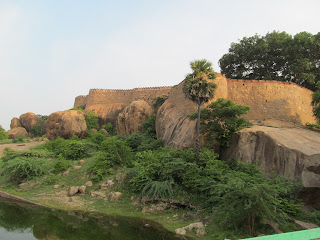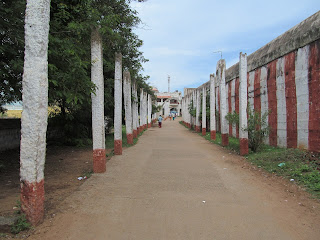Memorials
of South Indian Rebellion:
There is a dire need to bring out the details of South
Indian Rebellion, the ever first popular, armed and organized native resistance
against the British colonialism in the Indian subcontinent which rose from the
Southern Tamil lands – but still lying beneath the heaps of historic neglect.
There are several connected places which need to be recorded
and notified and preserved for the posterity.
Recently visited few such places on the en route of other
journeys:
Thirumeyyam fort complex is a declared National
monument under the control of ASI. It was the Northern outpost of erstwhile Raamnad
Kingdom located on the strategic Tanjore – Pudukkottai – Sivaganga /
Thirupathur Road. The fort was constructed by the Sethupathy King, Vijaya
Ragunatha Thevar @ Kilavan Sethupathy in the 17th Century. The fort was given by Sethupathy Kings to
Thondaimans of Pudukkottai. The fort was originally of 7 converging circular
walls around a rocky hill of which only 4 survive. The fort complex has ancient age rock- cut
temples of Pandya era.
It is somehow connected to Oomaithurai, the younger
brother of Kattabomman and the fiery spearhead of the South Indian Rebellion. The
locals refer the fort as the ‘oomayan fort’ i.e. the fort of the dumb referring
Oomaithurai. There is word of mouth that Oomaithurai was imprisoned here by
Thondaimans. The historic sequences need clarifications as only his elder brother
Kattabomman was arrested by Thondaimans and handed over to the British in the
aftermath of Panjalam Kurichy War -I.
However it is narrated in the modern Tamil classic, 'Kaaval Kottam' that during the great revolt of Southern Tamil Country against the British colonial occupation, Chinna Marudu's son Sivatha Thambi operated in the vicinity of this region with his platoons and opened up a corridor to the Tanjore region and brought in food grains to the drought hit south.
The rock cut temples are beautiful creations with several artful sculptures. The hill lock is called Sathyagiri. The Vishnu temple here is one among three most important Dhivya Desams - holy places in Tamil Vaishnavite religion - the other two being Thiruvarangam and Alagarmalai.
However it is narrated in the modern Tamil classic, 'Kaaval Kottam' that during the great revolt of Southern Tamil Country against the British colonial occupation, Chinna Marudu's son Sivatha Thambi operated in the vicinity of this region with his platoons and opened up a corridor to the Tanjore region and brought in food grains to the drought hit south.
The rock cut temples are beautiful creations with several artful sculptures. The hill lock is called Sathyagiri. The Vishnu temple here is one among three most important Dhivya Desams - holy places in Tamil Vaishnavite religion - the other two being Thiruvarangam and Alagarmalai.


The Satyamurthy Perumal temple gardener informed us that inside these rocky formations Kattabommu Nayak of Panjalamkurichy and his associates were rounded up by Thondaiman's forces and imprisoned. Later they were handed over to the British by Thondaman;
Serfoji King of Tanjore was a close ally of the British
during the crucial struggle of the natives against the British colonialism.
Manora is a minar or tower constructed by Serfoji on the Eastern seashore of
his kingdom in the early 19th century.
Manora was erected by Serfoji to commemorate the fall of the English enemy, Nepolean Bonaparte in Europe! Such was his loyalty to his ally!!
King Serfoji's alliance with the British effectively sealed the rebellion of Tamils against the British from spreading to the Northern parts and confined the rebellion to the Southern Tamil lands.
Manora was erected by Serfoji to commemorate the fall of the English enemy, Nepolean Bonaparte in Europe! Such was his loyalty to his ally!!
King Serfoji's alliance with the British effectively sealed the rebellion of Tamils against the British from spreading to the Northern parts and confined the rebellion to the Southern Tamil lands.
inside the first floor of the Minar;
Recent paved over bridge and the remaining latches indicating the earlier wooden bridges over the moat system;
Thirupathur:
The Marudu brothers were hanged to death in
Thirupathur. They came out of their hideouts from the nearby Singampunari jungles to protect
the Kalayar koil temple tower which they had constructed. The British
threatened to blast the tower if they do not surrender. On the last wish of the
elder Marudu, his head was laid in samadhu towards Kalayar koil temple. Thiruthalinadhar temple of Thirupathur is
consecrated by the Thevaram hymns of 7th century indicating the age
of this town.
Piranmalai:
Piranmalai is a mysterious ancient geological
formation. It is an interesting area of
geology which is yet to be brought out to popular perception that it is located
at a converging junction of the Eastern Ghats with the Western Ghats. From
Piranmalai the hilly contours of geological formations lead to Karantha Malai Hills
and Sirumalai Range wherein the Alagar malai range also converges and then the Ranges ultimately connects to the Palani Hills i.e. the grand Western Ghats.
Interestingly Oomaithurai said to have lived here for a
while during his exile from his native land and in association with the Marudu
brothers. Piranmalai was a military bastion of Marudu brothers. The adjacent Singampunari
forests provided a back up shelter. Oomaithurai travelled from Piranmalai to
Sirumalai and to Palani hills according to the narration of one ballad. There
is a mound atop the Piranmalai hills still referred as Oomayan Thittu.
Piranmalai is the much ancient country of Paari, the
Sangam age noble King. There are Sangam poetry associated with his court
scholar and poet Kabilar. In one of his poems, Kabilar explains the structural features
of the irrigation tanks of his country, Mullai country.
The Shiva temple at Piranmalai – in Thevaram hymns, it
is referred as Kodunkundram, is one of the Thevaram consecrated temples and
belong to the group of 14 such temples of Pandya country called ‘Paandi 14’ in
the Saivite religion.
The temple complex is structured in 3 layers over the hillock perhaps developed in different times.
The temple complex is structured in 3 layers over the hillock perhaps developed in different times.
I believe that Piranmalai hills along with the places in
south, Thiruvaadavur and Thiruchuli have some esoteric geological
connectivity since their primordial geology is mentioned in Tamil Saivite references.
The ancient temples and Sithar Samaadhus around the
Piranmalai area are focused and located towards the Piranmalai hills indicating
the enigmatic importance of Piranmalai location.
I hope a day may come to the Tamils to explore that importance and cherish it.
Piraanmalai temple views;
views of adjoining hill ranges in the West from Piraanmalai;
3 Sithar Samaadhus in Singampunari overlooking Piraanmalai hills nearby;
Piraanmalai view from Dargakudi Shiva temple in the distance;
Dargakudi Shiva temple of 13th century, under the State Archaeology Dept protection overlooks Piraanmalai;
views of adjoining hill ranges in the West from Piraanmalai;
 |
 |
| the exemplary stone over roofing mazonry resembles Thiruperunthurai temple roof works |
 |
| Sangam age King Paari's depiction atop a mandap in Piraanmalai temple |
Piraanmalai view from Dargakudi Shiva temple in the distance;
Dargakudi Shiva temple of 13th century, under the State Archaeology Dept protection overlooks Piraanmalai;



































































No comments:
Post a Comment